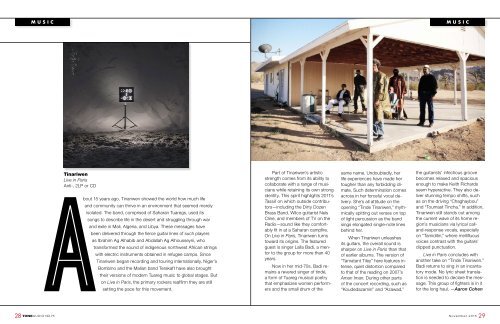Create successful ePaper yourself
Turn your PDF publications into a flip-book with our unique Google optimized e-Paper software.
MUSIC<br />
MUSIC<br />
Tinariwen<br />
Live in Paris<br />
Anti-, 2LP or CD<br />
A<br />
bout 15 years ago, Tinariwen showed <strong>the</strong> world how much life<br />
and community can thrive in an environment that seemed merely<br />
isolated. The band, comprised of Saharan Tuaregs, used its<br />
songs to describe life in <strong>the</strong> desert and struggling through war<br />
and exile in Mali, Algeria, and Libya. These messages have<br />
been delivered through <strong>the</strong> fierce guitar lines of such players<br />
as Ibrahim Ag Alhabib and Abdallah Ag Alhousseyni, who<br />
transformed <strong>the</strong> sound of indigenous northwest African strings<br />
with electric instruments obtained in refugee camps. Since<br />
Tinariwen began recording and touring internationally, Niger’s<br />
Bombino and <strong>the</strong> Malian band Terakaft have also brought<br />
<strong>the</strong>ir versions of modern Tuareg music to global stages. But<br />
on Live in Paris, <strong>the</strong> primary rockers reaffirm <strong>the</strong>y are still<br />
setting <strong>the</strong> pace for this movement.<br />
Part of Tinariwen’s artistic<br />
strength comes from its ability to<br />
collaborate with a range of musicians<br />
while retaining its own strong<br />
identity. This spirit highlights 2011’s<br />
Tassili on which outside contributors—including<br />
<strong>the</strong> Dirty Dozen<br />
Brass Band, Wilco guitarist Nels<br />
Cline, and members of TV on <strong>the</strong><br />
Radio—sound like <strong>the</strong>y comfortably<br />
fit in at a Saharan campfire.<br />
On Live in Paris, Tinariwen turns<br />
toward its origins. The featured<br />
guest is singer Lalla Badi, a mentor<br />
to <strong>the</strong> group for more than 40<br />
years.<br />
Now in her mid-70s, Badi remains<br />
a revered singer of tindé,<br />
a form of Tuareg musical poetry<br />
that emphasizes women performers<br />
and <strong>the</strong> small drum of <strong>the</strong><br />
same name. Undoubtedly, her<br />
life experiences have made her<br />
tougher than any forbidding climate.<br />
Such determination comes<br />
across in her forceful vocal delivery.<br />
She’s all attitude on <strong>the</strong><br />
opening “Tinde Tinariwen,” rhythmically<br />
spitting out verses on top<br />
of light percussion as <strong>the</strong> band<br />
sings elongated single-note lines<br />
behind her.<br />
When Tinariwen unleashes<br />
its guitars, <strong>the</strong> overall sound is<br />
sharper on Live in Paris than that<br />
of earlier albums. The version of<br />
“Tamatant Tiley” here features intense,<br />
quiet distortion compared<br />
to that of <strong>the</strong> reading on 2007’s<br />
Aman Iman. During o<strong>the</strong>r parts<br />
of <strong>the</strong> concert recording, such as<br />
“Koudedazamin” and “Azawad,”<br />
<strong>the</strong> guitarists’ infectious groove<br />
becomes relaxed and spacious<br />
enough to make Keith Richards<br />
seem hyperactive. They also deliver<br />
stunning tempo shifts, such<br />
as on <strong>the</strong> driving “Chaghaybou”<br />
and “Toumast Tincha.” In addition,<br />
Tinariwen still stands out among<br />
<strong>the</strong> current wave of its home region’s<br />
musicians via lyrical calland-response<br />
vocals, especially<br />
on “Tamiditin,” where mellifluous<br />
voices contrast with <strong>the</strong> guitars’<br />
clipped punctuation.<br />
Live in Paris concludes with<br />
ano<strong>the</strong>r take on “Tinde Tinariwen.”<br />
Badi returns to sing in an incantatory<br />
mode. No lyric sheet translation<br />
is needed to declare <strong>the</strong> message:<br />
This group of fighters is in it<br />
for <strong>the</strong> long haul. —Aaron Cohen<br />
28 TONE AUDIO NO.75<br />
November 2015 29


